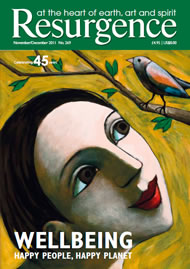Last year I set out to walk from my home in England to Istanbul, as part of an exploration of what it means to travel as a pilgrim in the 21st century. The original idea had been to finish in Jerusalem, but as it turned out I was called back for a court case in the winter, and I found myself back in England much sooner than I expected. After eight months with nothing to think about but where I’d sleep that night and what the weather would do next, I hurried back across Europe in four chaotic days of trains, hitches and buses (had I flown I could have done it in four hours) and spent the following four weeks sitting in a small box in a courtroom. Nothing seemed further apart from the ambling paths of the mountains. My experience seemed to be drifting away from me, becoming increasingly hard to integrate with the life I had returned to.
Something I discovered on my journey is that walking is, in fact, a remarkably mundane thing to do. For the most part, the days pass slowly and without drama. There are the occasional moments of incredible beauty, the occasional terrifying slip, the occasional slump into rain-drenched depression, but for the most part you walk the path and watch life pass around you. Yet it was this pleasant mundanity, I felt, that made it relevant to so many people I met. Rather than some impossible adventure to a far-flung globe, I was doing something almost everyone had a direct experience of. Moreover, I arrived in context, tracing a line from my home to theirs, and in doing so somehow connecting those places. Looked at in the right way, walking can teach you humility. Despite a journey of eight months across a continent, all I had really achieved was to put one foot in front of the other, no differently from anyone else. Now, suddenly, I was back, and people wanted to hear about the dramatic moments, about what it was like to finally arrive at my destination. It got me thinking about what the return means to us today, and how often it gets overlooked.
Once upon a time, of course, pilgrims were unable to fly back from Rome, from Mecca. The apparent destination was the halfway point, and once they arrived they had to turn around and walk back home again. The journey’s end was where they lived, their front door. On a walk to Santiago de Compostela a few years previously, a fellow walker told me that the outward journey was to think about the changes you wanted to make to your life, and the return was to think about how to integrate them. You crossed your threshold, and these ideas merged seamlessly into your life as you walked back into it. In fact, there was no real distinction to be made between your pilgrimage and the rest. At least, that was the idea.
During those first months back in England I started to think that today our society makes very little space for the return. There are few films that dare to continue more than a couple of minutes beyond the climax. The couple who get together at the end of a film quite possibly find they have nothing in a common a week later, once the dust has settled and the aliens have left – but we’ve kind of lost interest by then. Our stories fetishise the climatic moment, the idea that we are on some continual journey outwards, with no need to return, riding perpetually into our personal sunset. The lone cowboy, the superhero, the rebel: these modern archetypes glorify and promote the idea that the world is a corrupt and impure place and it is the role of the individual to sort it out before heading off alone and famous towards the next adventure as the credits roll. The brave individual treading a path to redemption, taking whatever risks are necessary, is not a far cry from the free-market capitalist. It is a story we love to hear.
As we focus on destinations rather than journeys, it becomes easy to think that it is possible to progress somewhere, to achieve something, as individuals. Yet a crucial part of the tale is lost. It was something that Joseph Campbell understood and explored in his idea of the monomyth – the journey of the hero has meaning only insofar as he is able to return and integrate what he has learnt into the life he left when he set out. Yet our modern myths instead describe a trajectory where we are on some endless journey upwards towards some eventual goal of our own choosing, some secular version of heaven. Unfortunately this is nothing but hubris, and the real end to that story is atomised individuals, hollow communities, and a return to solid ground entirely not of our own choosing. We live in a society in which arguably our greatest perversion is the glorification of the individual. If stories really do change how people see their place in the world, is there a way to try and tackle this by restoring the return?
Our task is not to glamorise the journey, but to return with what we have learnt, as an artist brings back a canvas from his conversation with the gods. We have to go home, and that requires humility. We have to understand that an individual’s experience only has meaning in relation to their community, for the community is how the individual is defined. The way we currently tell the stories of our heroes leaves them and their ideals outside of society, which at first glance is an extremely comfortable place for both their own vanity and the people whose ideas they are challenging. By not returning, the less glamorous but more important task of bringing home the wisdom of the journey is left undone. The story, like the journey, only takes us halfway, and leaves us far from home. The hero’s distant triumphs only serve to exacerbate the ongoing disconnect between our lives and fairyland – whatever solutions the hero discovers, they cannot become ours. In a peculiar way the very glorification of this individual removes our own sense of self, whilst a figure who is able to return and to give their experience back may be able to revitalise their community whilst adding to each individual’s power.
I couldn’t see this whilst I was walking, or even whilst I was sitting in the courtroom. But by beginning to reflect after my return, by talking to others, I realise that six months on this journey still has a story to tell. That is the crucial part of this tale, and to listen to that will take time.







